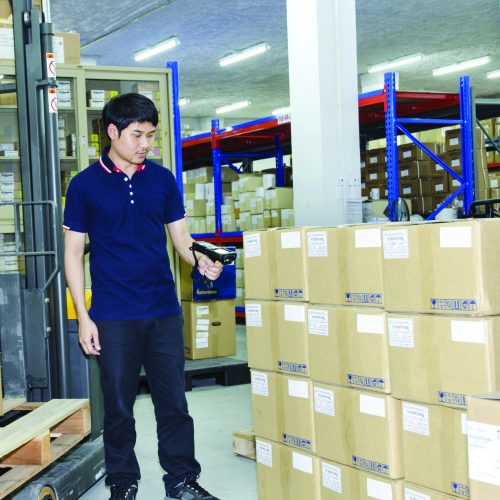FMD and supply chain security
Posted: 18 April 2017 | Jerome Bertin (SecurMed UK) | No comments yet
Over 12 months ago, the European Union delegated regulation that supplements the Falsified Medicines Directive (FMD) was published in the Official Journal of the European Union, starting the countdown to the deadline of 9 February 2019, when most EU member-states, and three non-members currently, are expected to have implemented all requirements of the directive…


The implementation of this directive is driven by the European Medicines Verification Organisation (EMVO) at the EU level, and SecurMed UK at the United Kingdom national level. SecurMed UK is a not-for-profit organisation, incorporated by several trade associations in the healthcare sector.
The case for change
The FMD will implement a Europe-wide medicines hub and national medicines verification in 32 countries, incorporating countries within the EU/European Economic Area (EEA), as well as some outside it, such as Switzerland. Why are we implementing FMD over the next two years, why is it important and why is it important now? There is a widespread view across the pharmaceutical industry that the UK medicines supply chain is very safe and there are enough controls in place to prevent falsified medicines entering the supply chain and ultimately reaching patients. So why is FMD needed in the UK?
Supply chain stakeholders perceive falsified medicines to exist primarily in online pharmacies, but not in the physical supply chain, that there haven’t been cases of falsified medicines in the UK since 2011, and most cases were identified in the period 2004-2011.1 However, the BBC reported on 18 June 2015 that the Medicines and Healthcare products Regulatory Agency (MHRA) had seized 6.2m medicine doses or medical devices worth £15.8m as part of Operation Pangea.2 The news article stated: “It is still unclear what the total size of the illegal drugs market is in the UK.” The World Health Organisation estimates that 1% of sales in developed countries are counterfeit medicines.2 In the UK, with approximately 2bn items dispensed per year, this would equate to 200,000 falsified medicine packs.
The FMD will implement safety features and labelling changes on all prescription medicine packs (and one OTC medicine so far), enabling medicines verification against a European-wide system. All parties in the supply chain are obliged to comply. The directive will enable all medicines packs to be verified as authentic prior to supply to patients and the will highlight falsified medicines events, where in the supply chain that pack appeared and the source of introduction. The process of medicines authentication at point of dispensing is termed “decommissioning”.
FMD implementation will enable the regulatory authorities to more easily issue product recalls, and the system will assist in identifying where packs are in the supply chain and prevent them, through the decommissioning process, from being dispensed to patients. FMD should also enable supply chain stakeholders to better perform stock control. Once FMD has been implemented in 2019, several other longer-term benefits and opportunities will become apparent for the medicines supply chain to further enhance the value of the Medicines Verification System (MVS).
Change complexity
Implementing FMD for the UK medicines supply chain creates several significant challenges for SecurMed
UK and user communities in the supply chain. The UK is one of the three largest, and probably the most complex, medicines supply chain markets in Europe, with all the major stakeholder groups represented. These are: branded and generic manufacturing, parallel distribution, a complex wholesale supply chain, large-scale public and private sector healthcare organisations, and a large community pharmacy sector.
It is estimated there are some 15,000 pharmacies, 1,200 dispensing doctors, 9,800 GP practices, 450 NHS and private hospitals, 700 clinics/urgent care centres, and 2,200 wholesale dealer’s authorisation holders (including nine major wholesalers).3,4 In addition, there are over 35,000 locations that may be determined under article 23 of the delegated regulation not to be healthcare institutions, such as dentists, care/nursing homes, opticians, prisons, police and military facilities, hospices, ambulance trusts and veterinary organisations3 – all of whom will need to have medicines decommissioned by other supply chain organisations, primarily wholesalers, prior to supply and dispense.


SecurMed UK, NHS Digital, the industry associations and FMD working groups are planning and coordinating the implementation of FMD to ensure all providers and user stakeholders are effectively engaged, managed and communicated to during the period up to February 2019, and on an ongoing basis thereafter.
SecurMed UK has responsibility to set up the UK Medicines Verification Organisation (MVO) and MVS, to work with IT providers to enable medicine packs to be verified and decommissioned against the MVS, to on-board the large number of user locations and to deploy the sustainable UK MVO, which will operate and support the medicines supply chain nationally following the FMD implementation date in 2019. The UK MVO will perform a central role in creation of information content and communications to support the rollout of FMD across the UK, but SecurMed UK does not have the remit or responsibility to rollout IT solutions and working practices within working locations, nor any industry costs beyond the provision of the UK MVO/MVS.
Key challenges lie in data ownership, data segregation, and data and information security. Working under the supervision of the MHRA and the Department of Health (the competent authority), SecurMed UK will implement the process for alerting the national competent authority of instances of potential falsified medicines and supply the necessary information and processes to enable investigation and incident resolution. The FMD system must also comply with any reimbursement, pharmacovigilance and pharmacoepidemiology roles mandated by the competent authority, as defined in article 39 of the delegated regulation. It has been agreed that those who submit data to the UK MVS or European hub MVS are the owners of that data, and the system needs to ensure adequate data segregation and that information security processes are implemented. SecurMed UK must also make regular data reports available to the competent authority for their remit of supervisory control.
Overall, the biggest challenge is time. While 9 February 2019 sounds a long way off, it is a little under two years at the time of writing. To successfully build the MVO/MVS, support technology and working practices change, and implement end-to-end working solutions at all locations, the timescale is very tight. Significant work effort, partnership and collaboration will be needed between SecurMed UK and all parts of the medicines supply chain, including the NHS and private healthcare sector, in order to get everyone ready to achieve and deliver FMD for the four countries of the UK in this timeframe.
Change context
For the UK, the most visible result of the FMD implementation over the next two years will be the Brexit negotiations on leaving the European Union. Stakeholders across the supply chain have widely different interpretations of what Brexit means and the impact, if any, on their preparations for the implementation of FMD. SecurMed UK works under the supervision of the MHRA/DH and the UK government’s guidance is as follows: “Until exit negotiations are concluded the UK remains a full member of the EU and all the rights and obligations of EU membership remain in force. During this period, the government will continue to negotiate, implement and apply EU legislation, including the ‘Safety Features’ policy under the Falsified Medicines Directive. The outcome of the exit negotiations will help determine what arrangements will apply once the UK has left the EU, however the government remains committed to providing a regulatory environment which protects health and improves lives.”
Accordingly, SecurMed UK has been instructed to continue as a full member of the Europe-wide FMD implementation, proceed with FMD implementation for the UK, and to select a blueprint IT service provider to set up the UK MVS. The current aim is to complete the IT service provider selection in early 2017.


It is recognised that other large changes across the UK healthcare sector will have influence during implementation of the FMD verification system. For example, the NHS Sustainability and Transformation Plans and national/devolved government pharmacy reimbursement arrangements. An FMD UK impact assessment consultation exercise will be run by MHRA/DH from April 2017, and the outcome of this may further impact and influence the UK’s implementation. SecurMed UK will continue to work closely with the competent authority to determine what changes this could make to FMD implementation, and develop the necessary responses and activity plans needed to ensure that implementation stays on track.
FMD implementation for the UK covers all four home countries. The Isle of Man and Channel Islands are under review by the MHRA/DH, with a target to confirm inclusion by April 2017. All British Overseas Territories, including Gibraltar and the Crown Dependencies, are currently considered out of scope of the UK FMD Implementation, but again the competent authority is still to confirm final decisions.
Successful FMD implementation will require engagement, coordination and collaboration between the national competent authority and its regulatory counterparts in the General Pharmaceutical Council (GPhC), Care Quality Commission (CQC), devolved healthcare representatives (CPS, CPW, PSNI) and others. The MHRA/DH is taking the lead role in coordinating FMD nationally and working with/supervising SecurMed on compliance with regulatory and quality requirements.
FMD will require a significant investment in IT solution change, people hardware and working practices, all to be borne by organisations already under pressure for cost reduction by other government initiatives. The European hub MVS and UK MVS will be funded by the manufacturers and parallel distributors as defined in the delegated regulation. Manufacturers will be responsible for making the necessary tamper-proofing changes to packs and to implement FMD labelling (2-D matrix and associated information). All other user organisations will need to invest in hardware, IT solutions, working practices, and resources within their own organisations in order to deliver to the FMD timeline.
Conclusion
In summary, the UK implementation of the FMD over the next two years represents a major technology challenge, business change, and investment for the whole UK medicines supply chain. The UK specifically has a number of other large changes, notably Brexit, which may influence, impact or change the way FMD is finally rolled out. SecurMed UK will ensure during this period that it meets its obligations to set up the UK MVO and MVS, work with software providers to interface with the MVS and to on-board users in readiness for the UK to actively participate in the FMD go-live on 9 February 2019.
About SecurMed UK
SecurMed UK was incorporated in 2016 as a not-for-profit organisation, as directed under the FMD Delegated Regulation, to set up the UK Medicines Verification Organisation (UK MVO) and Medicines Verification System (UK MVS). SecurMed UK is formed as a joint venture between the Association of the British Pharmaceutical Industry (ABPI), the British Generic Manufacturers Association (BGMA), the British Association of European Pharmaceutical Distributors (BAEPD), the Healthcare Distribution Association (HDA UK), the National Pharmacy Association (NPA), and the Company Chemists Association (CCA). SecurMed UK is supervised by the MHRA/Department of Health.
Biography


References
- Taking stock of counterfeit medicines. Sukkar E. The Pharmaceutical Journal. 5 June 2014.
- Record ‘fake drugs’ haul worth £16m by UK drugs agency. Gallagher J. BBC Health. 18 June 2015.
- Care Quality Commission. cqc.org.uk/content/how-get-and-re-use-cqc-information-and-data
- NHS Digital Organisation Data Service: https://digital.nhs.uk/organisation-data-service.
Issue
Related topics
Biopharmaceuticals, Packaging, Regulation & Legislation, Supply Chain, Therapeutics








